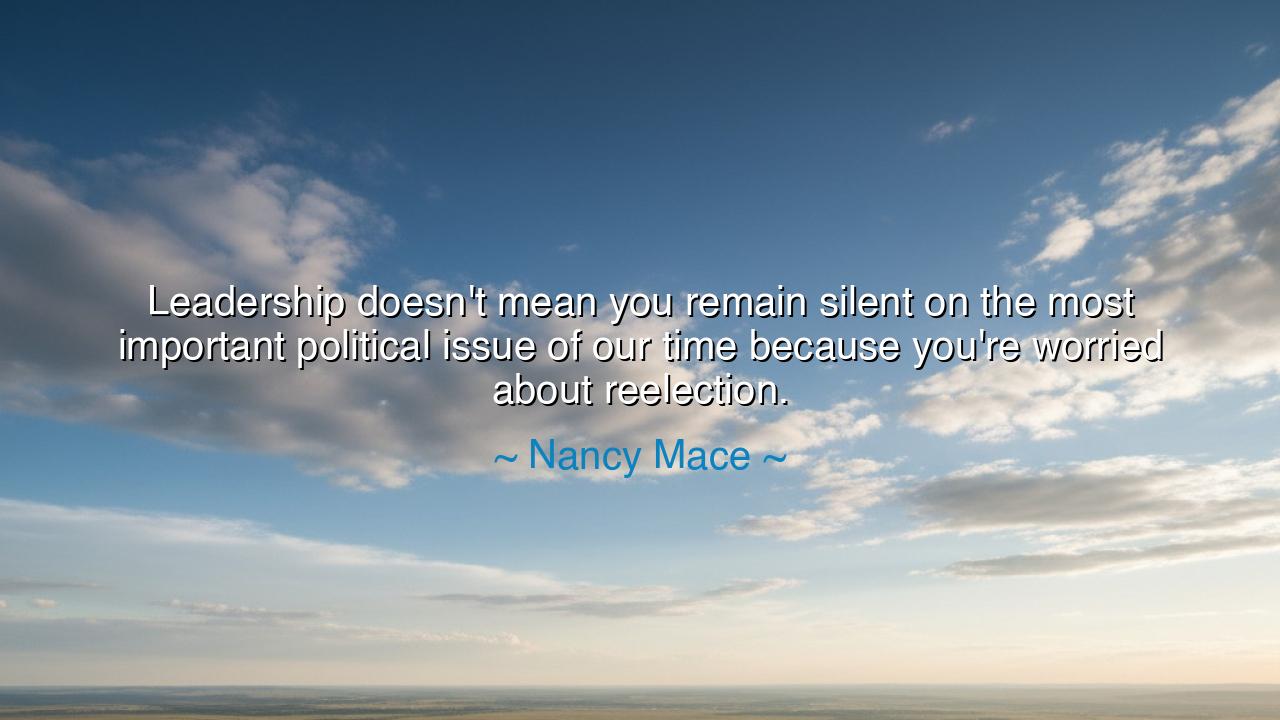
Leadership doesn't mean you remain silent on the most important
Leadership doesn't mean you remain silent on the most important political issue of our time because you're worried about reelection.






When Nancy Mace, the American congresswoman known for her independent voice, declared, “Leadership doesn’t mean you remain silent on the most important political issue of our time because you’re worried about reelection,” she was not merely speaking to her fellow lawmakers — she was summoning the eternal spirit of courageous leadership. Her words rise like a rebuke to the timid and a call to the brave. In them, one hears an ancient truth: that leadership is not about safety or self-preservation, but about conviction, about speaking truth even when silence would be easier, safer, or more profitable.
The origin of this quote lies in the heart of modern politics, where power and fear often walk hand in hand. Nancy Mace, known for defying her party when conscience demanded it, spoke these words as a reminder that the duty of a leader is to serve principle before position, truth before ambition. In every age, politics tests the soul: it offers the temptation of comfort and the peril of honesty. Her words slice through the fog of compromise to remind us that the measure of a leader is not in how long they hold power, but in how fearlessly they wield it for the good of others.
To remain silent in the face of injustice or crisis is not neutrality — it is abdication. History has never remembered kindly those who hid behind silence when the world demanded speech. In times of turmoil, silence from those in power becomes a kind of complicity. Mace’s statement echoes the timeless warning of the philosophers: that when the wise remain silent, the foolish and the wicked fill the void. Leadership, she insists, is not about guarding one’s seat; it is about standing upright when the storm comes, even if that stand costs one everything.
This truth has echoed through the centuries. Consider Sir Thomas More, who stood against the will of his king because his conscience forbade him to bow. His silence, when it came, was not the silence of fear but of defiance — a final act of moral speech. Or think of Abraham Lincoln, who risked his political future — and eventually his life — to speak against the evil of slavery. Many around him urged moderation, caution, delay. But Lincoln understood that leadership demands voice, and that silence in the presence of moral wrong is the death of integrity. Such examples remind us that true leaders are not those who calculate the odds of victory, but those who act from the certainty of duty.
Mace’s words also hold a mirror to the inner struggle of all who aspire to lead. Every leader faces the crossroads between fear and faith, between what is easy and what is right. The fear of losing status, security, or approval is a heavy chain — one that has shackled many before they ever truly led. But those who rise above it, who choose principle over politics, become the torchbearers of history. For in the end, it is not the comfort of the cowardly that endures, but the legacy of the brave.
Her message transcends politics. It speaks to teachers who must challenge ignorance, to citizens who must confront injustice, to parents who must guide with truth rather than ease. Leadership, in any form, means responsibility — the willingness to act even when action offends, to speak even when words bring loss. To remain silent in the face of wrong is to deny the purpose for which leadership exists. Every generation must remember that progress is born not from the fearful, but from the fearless.
The lesson of Nancy Mace’s words is as vital as it is eternal: do not confuse power with leadership, or comfort with integrity. To lead is to bear the weight of truth, to walk through the fire of criticism, and to speak even when one’s voice trembles. The true leader does not ask, “Will this help me win?” but rather, “Will this help others live better, freer, more just lives?” Such questions forge character stronger than any throne or title.
So, let her words be a clarion call to all who would lead — in politics, in families, in faith, in life: Do not be silent when the moment calls for courage. Speak truth, even when it costs you favor. Act justly, even when it risks your position. For leadership, stripped of courage, is but vanity — but leadership bound to conscience becomes immortal.






AAdministratorAdministrator
Welcome, honored guests. Please leave a comment, we will respond soon